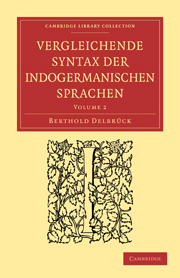Book contents
- Frontmatter
- Vorrede
- Inhaltsangabe
- Abkürzungen
- Kapitel XVI Tempora und Aktionen
- Kapitel XVII Die charakterisierten Präsensbildungen im Altindischen und Griechischen
- Kapitel XVIII Die aus einsilbigen Wurzeln gebildeten Formen (Präsentia und Aoriste)
- Kapitel XIX Die Formen aus Wurzeln auf o (mit o?)
- Kapitel XX Die Verba auf eiō
- Kapitel XXI Die indogermanischen Präsensaktionen im Germanischen und Slavischen
- Kapitel XXII Perfektivierung durch Verbindung mit Präpositionen
- Kapitel XXIII Das Perfektum
- Kapitel XXIV Die Aoriste
- Kapitel XXV Das Futurum
- Kapitel XXVI Mehrere Wurzeln zu einem Verbum vereinigt
- Kapitel XXVII Die Indikative im Arischen und Griechischen
- Kapitel XXVIII Die Indikative im Italischen, Germanischen, Litauischen, Slavisclien
- Kapitel XXIX Die Modi im Arischen und Griechischen
- Kapitel XXX Die Modi in den übrigen Sprachen
- Kapitel XXXI Die Genera Verbi im Arischen und Griechischen
- Kapitel XXXII Die Infinitive
- Kapitel XXXIII Partizipia und Verbaladjektiva
- Kapitel XXXIV Die Partikeln
- Index der Verbalformen
- Sach-Index
- Nachträge und Berichtigungen
Kapitel XXVIII - Die Indikative im Italischen, Germanischen, Litauischen, Slavisclien
Published online by Cambridge University Press: 05 August 2011
- Frontmatter
- Vorrede
- Inhaltsangabe
- Abkürzungen
- Kapitel XVI Tempora und Aktionen
- Kapitel XVII Die charakterisierten Präsensbildungen im Altindischen und Griechischen
- Kapitel XVIII Die aus einsilbigen Wurzeln gebildeten Formen (Präsentia und Aoriste)
- Kapitel XIX Die Formen aus Wurzeln auf o (mit o?)
- Kapitel XX Die Verba auf eiō
- Kapitel XXI Die indogermanischen Präsensaktionen im Germanischen und Slavischen
- Kapitel XXII Perfektivierung durch Verbindung mit Präpositionen
- Kapitel XXIII Das Perfektum
- Kapitel XXIV Die Aoriste
- Kapitel XXV Das Futurum
- Kapitel XXVI Mehrere Wurzeln zu einem Verbum vereinigt
- Kapitel XXVII Die Indikative im Arischen und Griechischen
- Kapitel XXVIII Die Indikative im Italischen, Germanischen, Litauischen, Slavisclien
- Kapitel XXIX Die Modi im Arischen und Griechischen
- Kapitel XXX Die Modi in den übrigen Sprachen
- Kapitel XXXI Die Genera Verbi im Arischen und Griechischen
- Kapitel XXXII Die Infinitive
- Kapitel XXXIII Partizipia und Verbaladjektiva
- Kapitel XXXIV Die Partikeln
- Index der Verbalformen
- Sach-Index
- Nachträge und Berichtigungen
Summary
Zusammenfassung der bisherigen Ergebnisse
Die bisherigen Untersuchungen über den Gebrauch der Indikative haben Folgendes ergeben:
Der Indikativ Präsentis der punktuellen Aktion versetzt die Handlung in die vor dem Sprechenden liegende Zukunft. Der Ind. Präs. aller übrigen Aktionen versetzt die Handlung in die Gegenwart des Sprechenden; ausserdem kann er bei dramatischer Darstellungsform praterital, bei ungenauer futurisch gebraucht werden.
Die Augmentform vom Präsensstamm versetzt die Handlung in die hinter dem Sprechenden liegende Vergangenheit. Bei punktueller Aktion wird sie zu einer Art des Aorists, in alien übrigen Fällen nennen wir sie Imperfektum. Das Imperfektum fordert den Hörer auf, sich vorzustellen, wie die Handlung vor sich ging. Es ist die Form der Erzählung. Insbesondere wird es gebraucht, wenn der Sprechende aus seiner eigenen Erinnerung etwas mittheilt, oder an die Erinnerung des Hörenden appelliert.
Der Indikativ Perfekti bezeichnet einen in der Gegenwart des Sprechenden erreichten Zustand oder eine in derselben Gegenwart abgeschlossene Handlung. Präteritale Verwendung scheint er in der Urzeit nicht gehabt zu haben.
Die Augmentform vom Perfektstamme wuide imperfektmässig oder aoristmässig gebraucht. Den Sinn der Vorver-gangenheit hat sie nicht gehabt.
Der Indikativ Aoristi versetzt die punktuelle Handlung in die Vergangenheit, er fordert also nur auf, sich vorzustellen, dass etwas geschah, nicht wie es geschah. Er erzählt nicht, sondern konstatiert. Die Vergangenheit kann entweder dem Sprechenden so nahe liegen, dass sie noch so zu sagen in seine Gegenwart hineinfällt, oder sie kann weiter zurückliegen.
- Type
- Chapter
- Information
- Vergleichende Syntax der indogermanischen Sprachen , pp. 308 - 345Publisher: Cambridge University PressPrint publication year: 2010First published in: 1897



